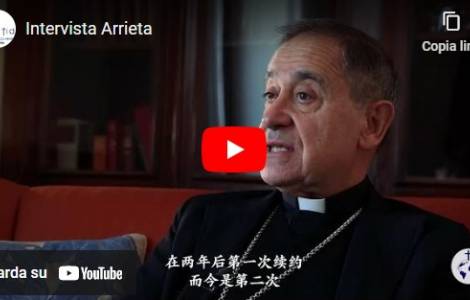VATICAN – Bishop Arrieta: the Agreement on the appointment of Chinese Catholic Bishops is not new in the history of the Church
VATICAN – Bishop Arrieta – The Agreement on the Appointment of Chinese Catholic Bishops isn’t new in the Church’s history
Rome (Agenzia Fides – The so-called sinicization of the Catholic Church China, i.e., the adaptation of ecclesial forms to the Chinese cultural context and social context, “is not a problem.” It is important that the “essential elements” that are the core of the Church’s nature are not lost in this adaptation. This is what Spanish Bishop Juan Ignacio Arrieta (Secretary of the Dicastery to Legislative Texts) affirms with determination in the video interview he conducted for Agenzia Fides by Teresa Tseng Kuang Yui (see attached).
Bishop Arrieta says that the Catholic Church has always recognized the legitimacy of including elements from each country and traditional expressions from each culture in its mission. Only condition is that adaptations don’t compromise or obscure the “essential” genetic factors that form the identity of the Catholic church, and the performance that is appropriate to it.
The Secretary of Dicastery for Legislative Texts also commented in this regard on the Provisional Agreement Between the People’s Republic of China (September 2018) and the Holy See (October 2018), regarding the appointment of Chinese Bishops.
Bishop Arrieta says that the Agreement on the processes of episcopal appointments in China is intended to ensure that the appointments of bishops to the head of Catholic communities are made “by mutual accord between the Chinese government” and “by the Pope”, who according to the Code of Canon Law has the prerogative of freely appointing or confirming bishops who have been legitimately elected (Can. 377, §1).
Bishop Arrieta also pointed out that the Holy See and the “legitimate authorities of the Chinese people”, mutually recognize one another as interlocutors in the relations established to sign and verify the Agreement.
The Secretary of the Dicastery of Legislative Texts emphasized that the direct participation by civil authorities in the appointment of Catholic bishops is not a Chinese prerogative nor a new feature in the history and practice of the Church.
In this sense, Bishop Arrieta was born in Vitoria in the Basque Country. He recalls what happened in Spain during Francisco Franco’s time, when the Government presented three names to the Pope and the Spanish bishops were elected.
In the video interview’s first few lines, Bishop Arrieta admits that he has spent 20-years building relationships and exchanges between “Chinese friends” as well as visiting China to be impressed by the people “with an antique culture”. Arrieta states that he is not directly involved in relations of the Holy See to representatives of China’s government. He also reiterates his commitment to working according to his abilities to increase confidence between Beijing and Beijing, cultivating friendships with Chinese academics, scholars, and others.
Bishop Arrieta refers specifically to his efforts in disseminating the study of ecclesiastical Chinese law, in order for those who are interested in civil law regulations relating in China to believers communities to reflect and deepen their understanding.
Juan Ignacio Arrieta Ochoa de Chinchetru was born April 10, 1951. He was ordained a priest of the Prelature of the Holy Cross on August 23, 1977.
He was awarded doctorates in canon and jurisprudence, and served as professor of Canon Law at the University of Naples (Spain), then in Rome and Venice. From its inception in 1984, he was the Dean of the Faculty of Canon Law of the Pontifical University of the Holy Cross. He also served as Dean of the Faculty of Canon Law from 1995 to 1999.
He was appointed Dean of the Institute of Canon Law of Saint Pius X in Venice in 2003. He was named titular bishop of Civitate in April 2008, and was made secretary of the Pontifical Council (today Dicastery), for Legislative Texts on February 15, 2007. His episcopal consecration took place on 1 May 2008.
In his essay on the organizational aspects in Church-State relations, published in the volume “The Agreement between The Holy See and China”, Bishop Arrieta relates to the events of Chinese Catholicism. He says that “canon Law, due to it’s flexibility, continues to have the ability to resolve now, as in different cultures, historical situations, and problems that may arise. It still respects only the essential elements theology and theology” of Catholicism. (GV) Agenzia Fides, 23/11/2022)
Share:
Source: fides.org
